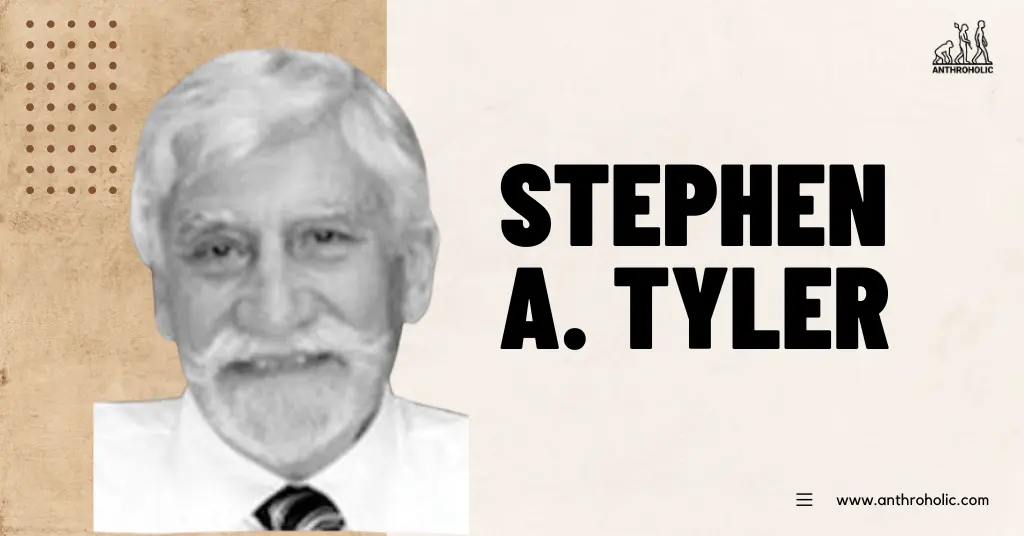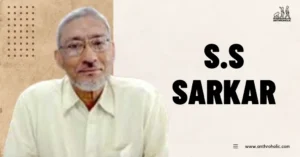AI Answer Evaluation Platform Live Now. Try Free Answer Evaluation Now
Stephen A. Tyler
Stephen A. Tyler was a singular voice in 20th-century anthropology, navigating the turbulent transitions from structuralism to postmodernism with clarity, depth, and daring originality. His intellectual journey defied neat categorization-beginning with formal linguistic analysis, moving through the corridors of cognitive anthropology, and ultimately leading the charge into postmodern critiques of representation and language.

From fieldwork among the Koya people in India to philosophical explorations of “the unspeakable” in human discourse, Tyler reshaped how anthropologists think about meaning, culture, and communication. He wasn’t just analyzing texts and symbols-he was interrogating the very foundations of ethnographic authority.
Early Life & Education
Stephen Albert Tyler was born in 1932 in Hartford, Iowa, into a Midwestern farming family. Following adolescence, he served in the U.S. Air Force during the Korean War, an experience that helped shape his later interests in communication and culture .
After his military service, Tyler completed his BA at Simpson College before pursuing graduate studies at Stanford University, earning both his MA and PhD in anthropology. His early intellectual inspirations included Douglas Haring’s Personal Character and Cultural Milieu, Gregory Bateson’s Naven, and Ruth Benedict’s Patterns of Culture, which laid the groundwork for his future in the anthropology of language and personality.
Early Academic Appointments (1964–1970)
- University of California, Davis (1964–1967)
Tyler began his academic career as an assistant professor. It was during this period that he first developed his interest in kinship systems through linguistic and structural analysis. - Tulane University, New Orleans (1967–1970)
Promoted to associate professor, his teaching expanded to include broader topics in cultural anthropology, while he continued developing his ethnographic and theoretical work.
Rice University & Institutional Leadership (1970–2010)
In 1970, Tyler joined Rice University in Houston as part of a newly founded anthropology department and became its first chair, a role he held into the 1990s. He later held the prestigious Herbert S. Autrey Professorship in Anthropology and Linguistics from 1990 until becoming Emeritus .
During his nearly four decades at Rice, he was instrumental in founding the university’s linguistics program. His editorial roles during this time included serving as associate editor for major journals including:
- American Ethnologist (1973–1976)
- Annual Review of Anthropology (1973–1992)
- Cultural Anthropology (1984–1993)
- Journal of Anthropological Research (1981–2010)
He formally retired in 2010, leaving behind a vibrant program and a legacy of institutional development .
Fieldwork, Major Publications & Scholarly Contributions
Ethnographic Fieldwork in India: Koya Studies
Together with his wife Martha, Tyler lived among the Koya people of India beginning in the early 1960s, conducting in-depth linguistic and kinship research. From this fieldwork emerged two seminal works:
- Koya: An Outline Grammar (Gommu dialect) (1969), a rich descriptive grammar that combined linguistic structure with cultural context.
- India: An Anthropological Perspective (1973), a comprehensive ethnological study of India rooted in his field experience which synthesizes structural and cognitive frameworks.
Tyler’s earlier articles-such as “Koya Language Morphology and Patterns of Kinship Behavior” (1965) and “Context and Variation in Koya Kinship Terminology” (1966)-further highlight his deep engagement with how language and social organization shape each other.
Cognitive Anthropology
In 1969, Tyler edited Cognitive Anthropology, a landmark volume that shaped the field by illustrating formal methods-folk taxonomies, ethnosemantics, componential analysis-to represent emic cultural logic. It became foundational in cognitive anthropology, emphasizing that anthropologists must rigorously analyze people’s internal organizing principles rather than simply observing behavior.
The Said and the Unsaid (1978): Context & Critique
Tyler’s The Said and the Unsaid critiqued tendencies within linguistic anthropology to treat meaning as purely referential and decontextualized. He emphasized how understanding requires attending to what is unsaid, contextual subtleties, and hermeneutic frameworks. This work laid the groundwork for his turn toward rhetorical and interpretive anthropology.
Postmodern Turn – Rhetoric & Representation
In the mid‑1980s, Tyler embraced and advanced a postmodern perspective grounded in rhetoric, discourse, and representation:
- Post‑modern Anthropology: From Document of the Occult to Occult Document (1986) reshaped ethnographic form by advocating multiple textual genres, reflexivity, polyphony, pictorial writing, and middle voice-pushing ethnography beyond linear credibility.
- The Unspeakable: Discourse, Dialogue, and Rhetoric in the Postmodern World (1987/8) crystallized his argument that rhetoric-not referential logic-is foundational to how cultures communicate and understand.
Rhetorical Anthropology & Middle Voice
Later, in collaboration with Ivo Strecker, Tyler advanced rhetorical anthropology, a paradigm that reconceives language as inherently performative and rhetorical. He foregrounded the middle voice, where the speaker is both agent and recipient, destabilizing linear models of communication and agency.
Theoretical Impact
Tyler’s trajectory-from structural-linguistic and cognitive models to hermeneutics, linguistic critique, and rhetorical performance-embodies the disciplinary shifts of late 20th-century anthropology. His work intersects with major intellectual movements: structuralism, cognitive science, semiotics, post-structuralism, and rhetorical theory.
Legacy & Influence on Anthropology
Stephen A. Tyler’s intellectual arc not only mirrored but helped shape the transformations of anthropology from mid-century structuralism to the rhetorical and reflexive turns of the postmodern era. His career was defined by a deep commitment to examining how language, meaning, and culture are constructed-not just described-by anthropologists.
His early work in cognitive anthropology brought rigor and precision to the study of emic categories, demonstrating that culture could be systematically analyzed through the lens of classification and meaning. Cognitive Anthropology (1969) still serves as a foundation for the field, laying groundwork for future studies in folk knowledge and semantic domains.
Yet Tyler did not remain within any single school. He moved from a formalist and structuralist stance toward more critical and philosophical inquiries, questioning the very language and form of anthropological writing. His groundbreaking argument in Post-modern Anthropology and The Unspeakable was that ethnographic texts should be seen not as mirrors of reality but as rhetorical acts-laden with power, voice, and absence.
Tyler’s advocacy for the middle voice-a linguistic and philosophical concept that resists binary oppositions of subject/object or actor/acted upon-offered anthropologists a radical new way to conceive agency and narrative. His later collaborations on rhetorical anthropology redefined how ethnographers engage with their subjects and write about them, emphasizing relationality, ambiguity, and performativity over detached description.
In his decades at Rice University, Tyler mentored generations of anthropologists, built a department from the ground up, and helped steer anthropology into new intellectual waters. His roles as editor, teacher, and theorist positioned him as a bridge between tradition and innovation.
Stephen A. Tyler passed away in April 2020, but his voice-sometimes quiet, sometimes radical-remains embedded in the questions anthropologists continue to ask about language, representation, and the ethics of speaking for others.
References
- Rice University remembrance (April 2020), summarizing Tyler’s roles, influence, and career milestones
- Rice University faculty profile, confirming publications and research areas
- SAGE Encyclopedia article confirming collated information on fieldwork among the Koya https://sk.sagepub.com/ency/edvol/theory-in-social-and-cultural-anthropology/chpt/tyler-stephen
- Google Books and AbeBooks metadata describing The Unspeakable as a postmodern, rhetorical critique https://books.google.com/books/about/The_Unspeakable.html?id=mh5rkNrwnFQC
- JSTOR review and PhilPapers metadata affirming Tyler’s argument for ethnography as discourse and rhetoric https://www.jstor.org/stable/30028102
- Google Books record of The Unspeakable confirming publication details
- Encyclopedia.com profile covering Tyler’s chair position, publication list, and editorial roles
- EveryCulture entry listing Tyler’s Koya: An Outline Grammar and fieldwork https://www.everyculture.com/South-Asia/Koya.html



